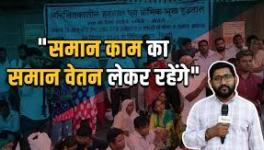Announcement of Repeal of Farm Laws Big Setback to Neoliberalism
The announcement of the repeal of the three farm laws almost a year after farmers launched a massive movement against the Narendra Modi government’s contentious decision in which 671 protesters lost their lives is a setback to the neoliberal move, which intended to further corporate encroachment in agriculture.
The organisations leading the struggle have argued that their protest will continue till the laws are legally repealed and also reiterated their demands for a legal guarantee for minimum support price and issues concerning electricity and seed bills remain relevant.
The reiteration is relevant since these laws involve an attempt to promote corporate encroachment in agriculture by accelerating the squeeze on farmers both from the side of demand and cost. The squeeze has had a deleterious impact on the viability of agriculture, wages, employment and working conditions of workers and the very existence of the public distribution system.
Those who ignore this dimension of corporate invasion mistakenly claim that the struggle against the laws involves only the interests of the rural elite. This mistaken view is further contradicted by a recent study on the lives lost in the struggle at Delhi borders during the struggle by Lakhwinder Singh and Baldev Singh Shergill. They point out that most of the participants in the struggle are small farmers. Their study indicates that the average landholding of farmers who were killed is merely three acres once leased land is taken into account.
Undoubtedly, the deleterious impact would have been magnified by the economic disruption that was induced by the flawed response to the pandemic. The large-scale reverse migration to the rural areas, the relatively limited quantum of actual financial support to the working people and the attenuation of the Mahatma Gandhi National Rural Employment Guarantee Act, 2005, have had a devastating impact on the economy, especially in the rural areas. The overcoming of this devastation is intimately linked to the political possibilities that may be opened up by the setback to neoliberalism.
The attempt to impose the three laws was not only an assault on farmers and workers but also an effort to reconfigure the contradictory bourgeois-landlord alliance to the detriment of the rural elite. An understanding of this detriment underlies the lack of support to the laws by most opposition parties. However, their direct involvement in the struggle was circumscribed by the fact that they themselves are a component of the neoliberal project. But it is likely that the magnitude of the setback may reduce their fidelity to the neoliberal project itself.
The role of the Left in this setback to neoliberalism is significant. Left organisations (both peasant and workers) have not only played a significant part in decision-making at the level of leadership of the resistance but the legacy of their record of struggles also played a role in ensuring that the movement itself remained not only democratic but also broad-based. In Punjab, for instance, the credibility of and popular support for the struggle was enhanced by the participation of the Left, whose fight against the British, imperialism and leadership of peasant struggles played a contributory role.
The protest, which spanned large parts of the country, has galvanised the protest against the autocratic government. In a period of more than seven years, it is the first significant reverse suffered by the government, which is promoting neoliberalism at breakneck speed.
The announcement of the repeal of the laws is partly a result of the realisation by the government that all their efforts through repression, misinformation and attempted division of the struggle have failed. The Bharatiya Janata Party has anticipated that this failure would result in a severe setback in the upcoming Assembly elections, including in Uttar Pradesh and Punjab. Attempts are ongoing by the ‘inhouse’ components of the corporate media to ‘spin’ the setback as a “bold” and “visionary” initiative of Modi.
However, the media spin is unlikely to work since the impetus that the victorious struggle has provided to the democratic movement is likely to initiate further popular resistance to the neoliberal project. The popular resistance will no doubt draw on the lessons from the farmer struggle that promoted an alliance between peasants and workers, combatted gender and caste oppression and built solidarity among the various constituents of the democratic movement.
However, the popular resistance will advance only if the Opposition presents a united front that should have a common minimum programme against both the autocratic tendency and the neoliberal project. The elements of such a common minimum programme would no doubt need to include measures such as a comprehensive package of policy support to agriculture, an expanded employment guarantee scheme, a return to a universal public distribution system, etc.
(Navpreet Kaur is an assistant professor at Janki Devi Memorial College and C Saratchand is an associate professor at the department of economics, Satyawati College, University of Delhi. The views expressed are personal.)
Get the latest reports & analysis with people's perspective on Protests, movements & deep analytical videos, discussions of the current affairs in your Telegram app. Subscribe to NewsClick's Telegram channel & get Real-Time updates on stories, as they get published on our website.
























